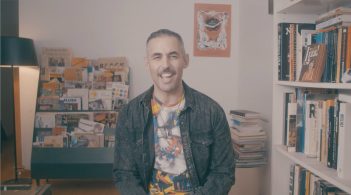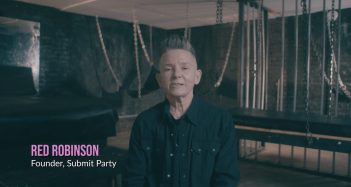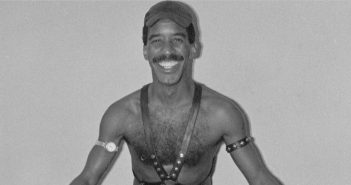By Robert St. Martin

Los Angeles, CA (The Hollywood Times) 7/20/23 – This year’s Outfest 2023 included several Episodics and I had an opportunity to interview several of the creators of new Episodics. One of these is Michael Leibenluft’s How to Have Sex in a Pandemic, a four-part episodic that focuses on parallels between how the deadly AIDS epidemic in New York City helped queer people be creative about solutions for sex during the recent COVID pandemic. I talked to Michael about his docuseries, which he has been directing in conjunction with Adam Baran, a co-producer. The first episode provides an umbrella account of how the City of New York figured out how to advise people on the dangers of air-borne virus like COVID and how to minimize risk and still have sexual activities. The solution was to devise a personal glory hole for sex play in one’s own home or apartment. Obviously, this was somewhat similar to the common glory holes of pre-AIDS restrooms and sex clubs, which allowed for anonymous sex experiences. In this case, the curtain-like barrier of cloth or plastic had a glory for touching and observing while one is still masked. Several sex-positive individuals are interviewed about how this devise allowed them to have plenty of sex during the COVID epidemic.
SELECT A SHOWING

In episode 2 of this docuseries, members of Brooklyn’s sex party scene grapple with how to keep their events alive during COVID-19. The sex party scene in New York emerged and grew rapidly after the 2005, due to the significant impact of PrEP for preventing infection with the HIV virus and also the fact that those who were already HIV-positive and taking proper anti-retroviral drugs that lowered the viral load to “undetectable,” could not infect others. In the 1984, the City of New York shut down all the sex clubs – gay or straight – in the city as well as bars that had sex activity occurring in them, like the Mineshaft and others. Currently in New York City, 130,000 persons are living with HIV/AIDS; more than 100,000 died from AIDS. After 2005, sex parties began to re-emerge in both the gay and straight night scene. This second documentary episode examines how some of these popular queer sex parties were happening in spaces that were largely hidden away and resembled dungeons from old-time sex clubs.

Along came COVID in 2019 and suddenly these sex parties had to make some tough decisions about the safety of those who wished to participate. The City of New York Health Department once again stepped in and issued guidelines for preventing COVID. As of June 2021, New York City reported more than 951,000 people tested positive for COVID and 33,000 died. For 18 months until some effective COVID vaccines came on the scene, these clubs were forced to shutter their doors. In an unlisted Brooklyn dungeon, organizers of New York’s kinkiest and most inventive play parties struggle to sustain their communities and keep them safe. Michael Wakefield runs the sex club that is the venue for these sex parties. During the AIDS crisis, restrictive legislation forced the parties underground, and the echoes of that stigma reverberate when the pressure of lockdown arrives.

Episode 2 in a docuseries about how Queer folks have drawn on lessons from the AIDS crisis to reinvent sex practices during the COVID-19 pandemic. Three of the sex party operators are interviewed in this segment of the documentary: Adam Baran, founder of NYC Inferno, Red Robinson, founder of Summit Party, and Lidell Jackson, AIDS Activist and founder of Jacks of Color, a club for black gay men. Jackson recounts how he first started his own sex club back in 1995, after the city had shut down all the sex clubs and seedy bars. At that time, those sex parties were about jacking off but no insertion was permitted. Michael Wakefield runs the sex club that is the featured venue for these sex parties in Brooklyn.


In this section, Adam Baran talks about reopening his sex party on May 21, 2020, the first sex party in 18 months. The themes are clever: Stars Whores: Voyage to Your Anus; Fuck E Cheese; Garden of Smurfy Delights. With music and performances, these sex parties are gatherings for gay people, “a place to be around some positive queer energy.”

After 18 months of social distancing, human interaction becomes overwhelming. Watching countless people play in sex parties with endless partners is daunting for many but particularly overpowering for those starved for sex. One has to wonder how COVID had changed the sex lives of many people and if that would propel people to attend sex parties since COVID became manageable due to vaccines. The episodic docu-series is focused on queer sex parties, but it should be noted that the same issues apply to so-called straight sex parties.

Although people came here for different reasons – to experiment, to sleep with as many people as possible, to have fun with their significant others – everyone also collectively experienced something similar: The potential to have sex straightforwardly, safely, and without stigma. So many people gave up having sex over the previous year and a half before May 2020. The reason was obvious: People were afraid of getting sick or infecting others and potentially dying. It went unspoken. Despite the reverie and ecstasy of that sexually charged space, the proximity to death in the recent past silently tethers us to each other.

Currently Michael Leibenluft is working on Episodes 3 and 4 of his docu-series of How to Survive a Pandemic. He showed his Episode 2 on Friday, July 17, at the Directors Guild of America as part of set of Episodics included in Outfest Los Angeles 2023. It can still be viewed with the other Episodics through this weekend via Outfest Streaming (Go to: www.Outfest.org.)
Michael Leibenluft (he/him) is an Obie Award-winning theater and film director based in Brooklyn, NY. He is the creator, director and co-producer of How to Have Sex in a Pandemic, first developed in BRIC’s Documentary Lab and selected as a Vimeo Staff Pick and at film festivals globally (follow @sexinapandemic on social media). Michael’s theater directing credits include I’ll Never Love Again (a chamber piece) by Clare Barron at the Bushwick Starr (Obie Award for Direction, 2016; NYT and Time Out Critics’ Picks), How I Learned to Drive by Paula Vogel with Drum Tower West Theater in Beijing, Lost Tribe by Agnes Borinsky as part of Target Margin’s Yiddish Theater Lab, The Subtle Body by Megan Campisi at 59E59 Theaters and the Shanghai Dramatic Arts Center, and other projects.
Michael is the founder of Gung Ho Projects (www.gunghoprojects.com), a New York-based performance, film, and education platform aimed at creating opportunities for self-expression, empowerment, exchange, and understanding across linguistic and cultural divides. This October, in partnership with Yangtze Rep, Gung Ho will associate produce the world premiere of Salesman之死 by Jeremy Tiang at the Connelly Theater in NYC. The bilingual play is inspired by Arthur Miller directing Death of a Salesman in China.




